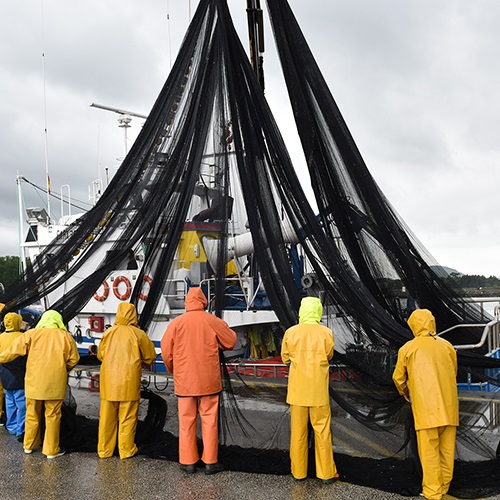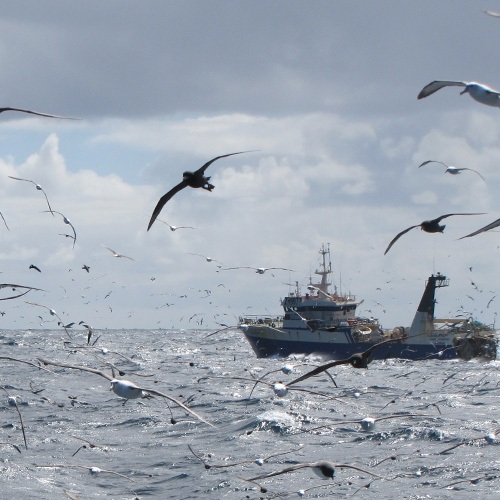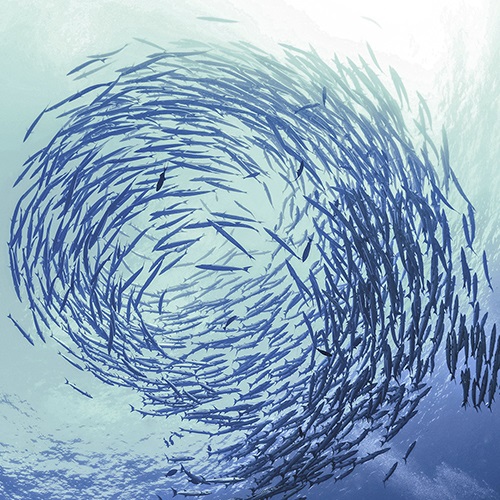The UN Sustainable Development Goals (SDGs) are 17 goals to end poverty, protect the planet, and ensure prosperity for all.
The SDGs provide a shared vision of the future, and a framework to guide governments, industry, non-profit organisations and the entire global community in working together for a better world. MSC certification is used by countries and organisations as part of their commitments towards delivering SDG14 on Life Below Water. Our work also helps efforts to strengthen food security (SDG2), promote sustainable economic growth (SDG8), promote sustainable consumption and production (SDG12), and strengthen global partnerships for sustainable development (SDG17).
Read more about seafood certification and the SDGs: linking ocean health with lives and plates.
Find out how New Zealand is approaching the UN Sustainable Development Goals.
UN SDG 14 and the MSC
SDG 14: Life below water
SDG 14: Conserve and sustainably use the oceans, seas and marine resources for sustainable development
Our vision is of the world's oceans teeming with life and seafood supplies safeguarded forever. The MSC program is recognised by the UN as an important tool to achieve the goals of SDG 14.
Committing to SDG 14 joins our efforts with the hundreds of others working to:
- end overfishing
- restore fish stocks
- protect ecosystems
- eliminate illegal, unreported and unregulated fishing
Read the MSC’s voluntary commitment to ocean health from the UN Ocean Conference 2017
Read our blog Six practical solutions to tackle overfishing
Read about recent progress in MSC certified fisheries leading the way in delivering UN Sustainable Development Goals
“On this one blue planet, the ocean unites us all. When it comes to caring for the ocean's well-being, we are all in this together.”
United Nations Secretary General's Special Envoy for the Ocean
Teaching and learning about SDG 14
We have a wide range of ocean themed lesson plans and teacher resources that deep dive into the topics surround SDG 14 such as overfishing, illegal fishing, marine ecosystems and healthy fish populations.The role of certification programs
The MSC and other credible standard setters have a key role to play in helping companies and governments to achieve the SDGs. We can provide best practice guidance for ‘what good looks like’ in a specific industry and create roadmaps for action.
In 2017, the MSC convened 27 leading seafood businesses - Leaders for a Living Ocean - to commit to sourcing and providing sustainable seafood.
Read SDGs mean business: How credible standards can help companies deliver the 2030 agenda, a report from WWF and ISEAL.
The MSC program brings together businesses, NGOs and governments to develop and implement science-based sustainability principles, criteria and measurements of progress. We are proud to be globally recognised for our multi-stakeholder approach that helps turn potential conflict into positive collaboration.
Providing data to the United Nations
Data from the MSC is used by the UN Environment Programme and other intergovernmental organisations to track progress towards international goals to end overfishing and protect biodiversity.
In 2010, the international community set 20 targets under the UN’s Convention on Biological Diversity. These ‘Aichi Targets’ map global efforts to conserve biodiversity around the world.
As an official biodiversity indicator partner, the MSC supplies data to help assess progress towards Aichi Targets six and four.
Aichi Target six:
- Reduce direct pressures on biodiversity and promote sustainable use
Aichi Target four:
- Mainstream biodiversity across government and society
Read about progress towards achieving the Aichi Targets in What does the UN’s new biodiversity report mean for sustainable fishing?
Food security and decent work
MSC certified fisheries aren’t just safeguarding the natural environment. They also contribute to global targets to end hunger and ensure sustainable economic growth.SDG 2: End hunger, achieve food security and improved nutrition
Seafood provides a major source of protein to nearly 3 billion people. Maintaining or rebuilding fish stocks is essential to ensure the long-term availability of food.
SDG 8: Provide decent work and economic growth
Many fishers have experienced economic benefits, including access to preferred markets and price premiums, as a result of MSC certification. In the South African hake fishery, certification underpins up to 12,000 jobs.
Our retail partners and you
Everyone can contribute to the SDGS. By choosing products with the MSC blue label you are supporting well-managed, sustainable fisheries.
SDG 12: Promote sustainable consumption and production
By choosing products with the MSC blue label, consumers are supporting well-managed, sustainable fisheries. This encourages retailers to stock sustainably-sourced seafood and more fisheries to improve and become certified.
“With marine issues crossing national borders and jurisdictions, international sustainability standards are a vital tool to conserve and sustainably manage the vast oceans.”
'SDGs mean business: How credible standards can help companies deliver the 2030 Agenda'
Find out more

Our approach
Our approach means everyone can play a part in that future while enjoying seafood, not avoiding it.

Our collective impact
For more than 20 years fisheries, scientists, consumers and industry have been part of a collective effort to make sure our oceans are fished sustainably.

What is sustainable fishing?
Sustainable fishing means leaving enough fish in the ocean, respecting habitats and ensuring people who depend on fishing can maintain their livelihoods.
